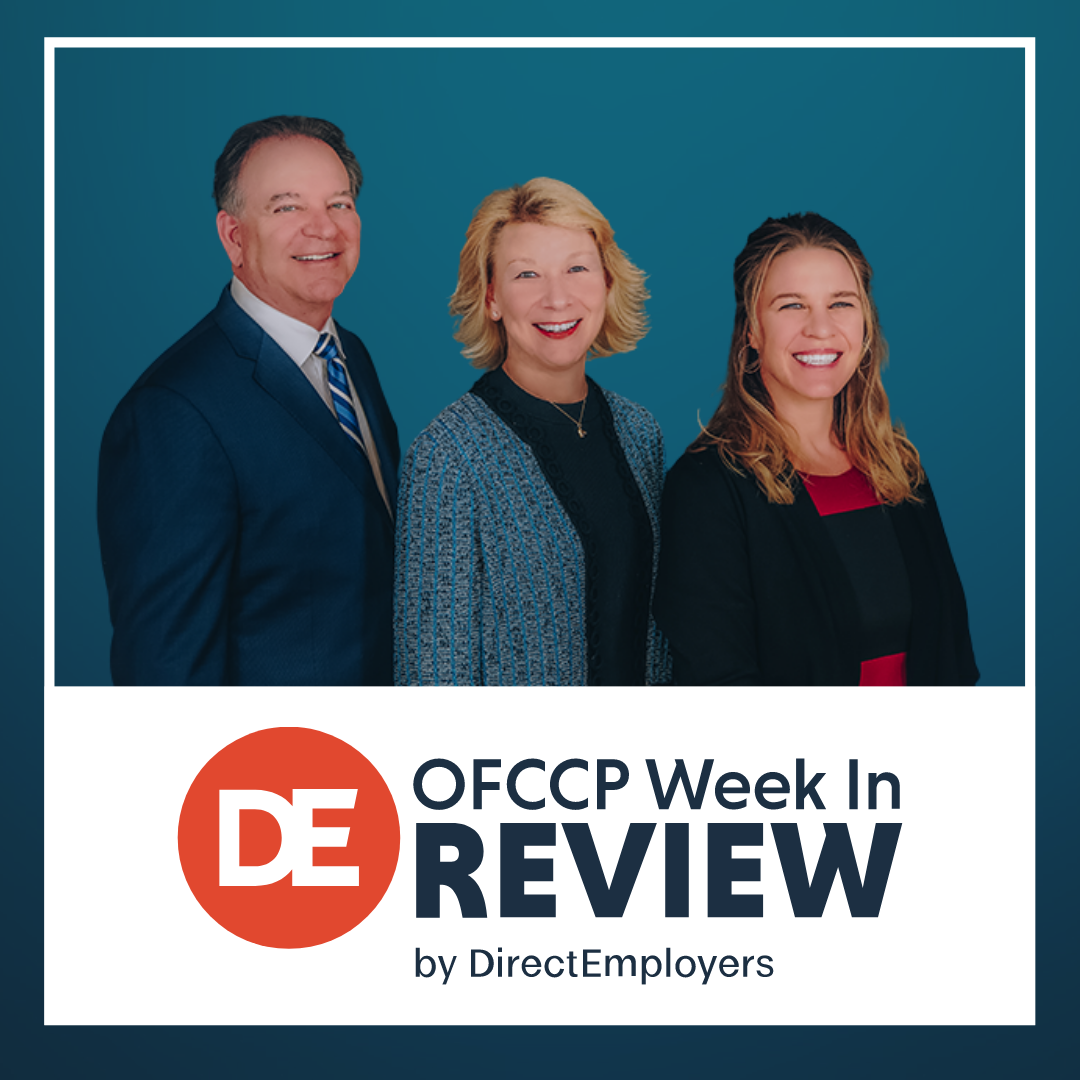 The DE OFCCP Week in Review (WIR) is a simple, fast and direct summary of relevant happenings in the OFCCP regulatory environment, authored by experts John C. Fox, Candee Chambers and Jennifer Polcer. In today’s edition, they discuss:
The DE OFCCP Week in Review (WIR) is a simple, fast and direct summary of relevant happenings in the OFCCP regulatory environment, authored by experts John C. Fox, Candee Chambers and Jennifer Polcer. In today’s edition, they discuss:
- This Week’s Vaccination Injunction Puzzle at a Glance
- The Iowa Supreme Court Gives A Male Transgender Employee The Win On The Restroom Dispute and On Gender Reassignment Surgery
- The DUNS Number is Out – Federal Contractors Must Secure a New “Unique Entity Identifier”
- EEOC To Shift to Democrat Majority in July
- DOJ Provided Opioid-Specific ADA Guidance
- Update Your Affirmative Action Programs – the VEVRAA Hiring Benchmark Dropped to 5.5%
- NLRB Reported 57% Increase in Union Representation Petitions Since October 2021
- NLRB Counsel Announced Intent to Urge the Board That “Captive-Audience” Anti-Union Meetings for Employees Are Unlawful
- Fifth Circuit Court of Appeals Reinstated Biden Administration Vaccine Mandate for Federal Civilian Employees: Federal Courts Lacked Jurisdiction
- New Interpretation Confirms That WIOA’s Discrimination Prohibition “Based On Sex” Includes Sexual Orientation And Gender Identity
This Week’s Vaccination Injunction Puzzle at a Glance
Current Status:
Federal Employee Vaccine Mandate: 5th Circuit Overturns Nationwide Injunction on Federal Employee Vaccination Mandate Based on Lack of Jurisdiction
- In a 2-1 decision, a three-judge panel of the United States Court of Appeals for the Fifth Circuit (New Orleans) handed the Biden Administration its second major vaccination mandate court victory (after the Medicaid/Medicare Workers vaccination mandate win). The Fifth Circuit’s new decision comes on the heels of its earlier decisions addressing several lower court injunctions of various COVID-19 vaccination requirements. The court found that the federal civilian employee plaintiffs bringing this suit to stop President Biden’s Executive Order 14043 lacked “standing.” Standing is a legal concept requiring the ability of the plaintiff to even bring the subject lawsuit in the first place and is necessary to maintain jurisdiction in a federal court. The Fifth Circuit found the federal civilian employees lacked standing to challenge the President’s mandate. This was because the Civil Service Reform Act, the human resources law which governs the terms and conditions of employment of federal civilian employees, precluded the district court’s jurisdiction to hear the case (see full story, below)
- The Fifth Circuit also vacated the nationwide injunction against the federal employee vaccine mandate and instructed the U.S. District Court for the Southern District of Texas to dismiss the Feds for Medical Freedom, et al. v. Biden, et al. case on remand.
- Accordingly, the Biden Administration’s requirement that federal civilian employees become vaccinated, or face loss of employment is once again in effect subject to any appeal to the full bench of the Fifth Circuit (a so-called en banc hearing), or subject to any injunction from and appeal to the SCOTUS. The plaintiff employees’ next move will likely be to seek an expedited en banc hearing before the full court of the Fifth Circuit.
Monday, April 4, 2022: The Iowa Supreme Court Gives A Male Transgender Employee The Win On The Restroom Dispute and On Gender Reassignment Surgery
The Iowa Supreme Court upheld a jury verdict in favor of a transgender employee assigned a female sex at birth who claimed gender identity discrimination for denying him use of the men’s restrooms and locker rooms. The Court also affirmed the jury’s verdict that the State’s medical plan for employees of the Correctional Institute was unlawful because it denied coverage for gender reassignment surgery which would have otherwise been covered except as a remedy for the transgender employee’s “gender dysphoria”.
The Case is Vroegh v. Iowa Dept of Corrections & Wellmark INC
The Iowa Correctional Institute for Women (“the State’” or “the employer”) employed Jesse Samuel Vroegh (formerly “Jessie Sue Vroegh”) as a registered nurse from 2009-2016. Vroegh was born with female sexual organs and presented as a woman when hired. A few years later, doctors diagnosed Vroegh with gender dysphoria (previously referred to as “gender identity disorder”). Eventually, Vroegh began hormone therapy and in 2014 started living as a man. He also began changing his government identifications (birth certificate, driver’s license, social security card, etc.) to reflect his male gender.
The Law
The Iowa Civil Rights Act prohibits discrimination in employment based on ten specific characteristics, including since 2007, “gender identity”: “age, race, creed, color, sex, sexual orientation, gender identity, national origin, religion, and/or disability.” Iowa Code § 216.6(1)(a).
Editor’s Note: Iowa revised its state non-discrimination statute in 2007 to include gender identity. This is relevant as the Court denied Mr. Vroegh’s claims of discrimination on the basis of “sex.” Unlike the U.S. Supreme Court’s Bostock decision (see Thursday’s WIOA story below) in which the Court interpreted “sex” (as used in Title VII of the 1964 Civil Rights Act) to include sexual orientation and gender identity, the Iowa Civil Rights Act specifically defines gender identity as a protected status separate from the protection against sex discrimination. Here is how the Iowa Supreme Court interpreted the Iowa statute prohibiting employment discrimination “based on sex”:
“Sex” doesn’t expand to “gender identity” (or anything other than “sex”) simply because the statute contains an instruction that it be “construed broadly.” We may not through the judicial metamorphosis of words declare a Hulk where the legislature placed merely Bruce Banner. (pg. 24)
Editor’s Note: You just have to love mid-westerners. So down to earth and they also call balls and strikes like a Swiss judge. And what a great common-sense analogy to pick: the transformation of mild-mannered Bruce Banner into the angry Hulk! Marvelous imagery. Intriguing writing. Some may argue with the reasoning, but you just cannot argue with the quality of the writing!
The Bathroom Claim, First, and Then the Medical Plan Coverage Fight
Monday, April 4, 2022: The DUNS Number is Out – Federal Contractors Must Secure a New “Unique Entity Identifier”

- The UEI is a 12-character alphanumeric ID SAM.gov assigns to an entity.
- The managers of SAM.gov have removed the DUNS Number from the SAM.gov database.
- Entity registration, searching, and data entry in SAM.gov now (each) require use of the new UEI.
- Existing registered entities can find their UEI by following the steps in this FAQ.
- New entities can get their UEI at SAM.gov and, if required, complete an entity registration.
Federal Contractors
At the same time, E-Verify announced that federal contractors must obtain a UEI number from SAM.gov and update that number in E-Verify.
E Verify began to include a new UEI field for federal contractors around April 4. Employers that have indicated they are a federal contractor in E-Verify will need to provide their UEI number through their company profile. Program Administrators can log into their E-Verify account and click on ‘View Company Profile’ to update this information.
The UEI field will also be available during the E-Verify initial enrollment process later this fiscal year.
Note: While it is not a required field, E-Verify will still collect the DUNS number for all employer types.
Why The Change?
There doesn’t appear to be a more detailed answer other than:
“The transition from the DUNS Number to the Unique Entity ID is a federal government-wide initiative. The Office of Management and Budget (OMB) directed federal agencies to complete their system transitions to the Unique Entity ID no later than April 4, 2022. Agencies across the federal government have implemented changes.”
*DUNS
The Dun & Bradstreet D‑U‑N‑S Number is a unique nine-digit identifier for businesses. Dun & Bradstreet assigns the number once its patented identity resolution process identifies a company as being unique from any other in the Dun & Bradstreet Data Cloud. Companies, institutions, governments, and people around the world use the D‑U‑N‑S Number to identify and access information about businesses. It identifies a company’s Dun & Bradstreet business credit file, which may include firmographic data (company name, address, phone number, etc.), corporate family relationships (headquarters, branches, subsidiaries, etc.), and scores and ratings that assess different financial health indicators. Taken all together, DUNS has named the profile of information it supplies the Dun & Bradstreet Live Business Identity. Potential partners, lenders, and companies may request a business credit report about a business using its D‑U‑N‑S Number.
Tuesday, April 5, 2022: EEOC To Shift to Democrat Majority in July

Kalpana Kotagal is a Partner with prominent Washington D.C.-based civil rights plaintiff law firm Cohen Milstein, a member of the firm’s Civil Rights & Employment practice group, and Chair of the firm’s Hiring and Diversity Committee. Ms. Kotagal is co-author of the “Inclusion Rider,” referenced by Oscar-winning actress Frances McDormand in her 2018 Best Actress acceptance speech. Leaders have since adopted the Inclusion Rider across industries, including the Recording Academy, which announced the use of the Inclusion Rider in the production of the 2022 GRAMMY Awards, as well as JAMS, which included an Inclusion Rider option in its JAMS Domestic and International Clause Workbooks.
How We Got Here
See our story from September 2020, “EEOC Now Fully Staffed With Republican Majority.”
Tuesday, April 5, 2022: DOJ Provided Opioid-Specific ADA Guidance

“The opioid epidemic continues to pose an extraordinary challenge to communities across our country, and the COVID-19 pandemic has exacerbated this crisis. People who have stopped illegally using drugs should not face discrimination when accessing evidence-based treatment or continuing on their path of recovery. The Justice Department is committed to using federal civil rights laws such as the ADA to safeguard people with opioid use disorder from facing discriminatory barriers as they move forward with their lives.”
The 8-page document includes eleven questions and answers, including examples where applicable, from both an employer and employee perspective. Some of the critical employer questions to know and understand include:
- Does an individual in treatment or recovery from opioid use disorder have a disability under the ADA?
- Does the ADA protect individuals taking legally prescribed medication to treat their opioid use disorder?
- Does the ADA protect individuals with opioid use disorder who currently participate in a drug treatment program?
- Does the ADA protect individuals who are currently illegally using opioids?
- Does the ADA protect individuals with a history of a past opioid use disorder who no longer illegally use drugs?
- Does the ADA provide any legal protections for individuals regarded as having an opioid use disorder whether or not they have an opioid use disorder?
- Does the ADA protect individuals from discrimination based on their association with individuals who have opioid use disorder?
- Can employers have a drug policy or conduct drug testing for opioids?
Note: The guidance does not address the “direct threat” defense.
Wednesday, April 6, 2022: Update Your Affirmative Action Programs – the VEVRAA Hiring Benchmark Dropped to 5.5%
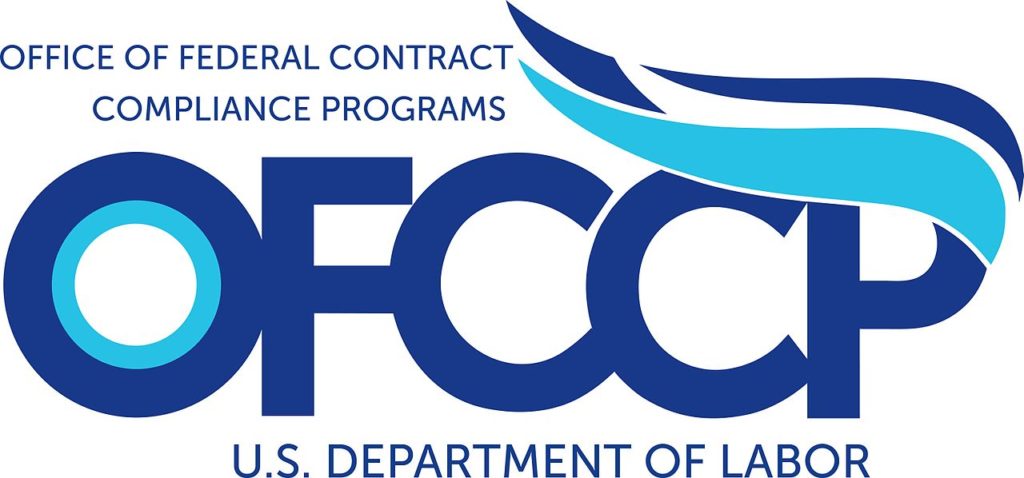
The national benchmark is now 5.5% (down from 5.6%). Since its inception in 2014, when the benchmark was 7.2%, we have seen the number steadily decline each year.
For those (very few) contractors which chose to calculate an individualized hiring benchmark, OFCCP also updated the state-level veteran availability data in the VEVRAA Hiring Benchmark.
What’s The Scoop on This Number?
The VEVRAA Hiring Benchmark is NOT the unemployment rate of Protected Veterans. Rather, it is the approximate percentage of Protected Veterans in the workforce at the time of publication. This was one of the two big changes to OFCCP’s 2014 Rules implementing Section 503 of the Rehabilitation Act of 1973 and VEVRAA. Those OFCCP Rules established a percentage “Utilization Goal” for Individuals with Disabilities and a percentage “Benchmark for hiring” Protected Veterans.
And, important to OFCCP’s Wednesday announcement, OFCCP began in 2014 for the first time to calculate for contractors the availabilities of both (a) Individuals with Disabilities, and (b) Protected Veterans. Note: OFCCP had always supplied construction contractors with the calculated availabilities of minorities and women (going back to 1978) but never for “non-construction” contractors (i.e., “Supply & Service” contractors).
We broke down the significance of the hiring benchmark in our oldy but goody blog from 2019:
VEVRAA Benchmark for Hires: How Much Do You Really Know About this Percentage and Its Meaning?
Wednesday, April 6, 2022: NLRB Reported 57% Increase in Union Representation Petitions Since October 2021
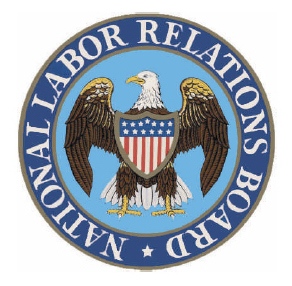
Details: The National Labor Relations Board (NLRB) announced that during the first six months of Fiscal Year 2022 (October 1–March 31), union representation petitions filed at the NLRB had increased 57% (from 748 to 1,174). In addition, unfair labor practice charges increased 14% (from 7,255 to 8,254).
The increased workload comes when staffing shortages plague the Agency, along with so many other organizations post-pandemic. The Agency staffing levels have dropped 39% since FY 2002, and field staffing has shrunk by 50%.
The NLRB has received the same Congressional appropriation of $274.2 million for nine consecutive years. However, last week, President Biden released his FY 2023 budget, which requests $319.4 million for the NLRB. This 16% increase hopes to modernize the Agency’s technology infrastructure but will not fully address staffing needs, according to The President. As detailed in its FY 2023 Congressional Budget Justification, more than three-quarters (77%) of the NLRB’s budget goes directly to staffing costs (as is true of most employment-related enforcement agencies).
“Right now, there is a surge in labor activity nationwide, with workers organizing and filing petitions for more union elections than they have in the last ten years. This has caused a significant increase in the NLRB’s caseload, and the Agency urgently needs more staff and resources to effectively comply with our Congressional mandate,” said NLRB General Counsel Jennifer Abruzzo.
To keep things in perspective, however, we reported in January 2022 that “Union Membership Falls Back to 2019 Rate, 10.3% of Employed Workers: Only 6.1% in the Private Sector.” However, this report was from the Bureau of Labor Statistics (BLS) 2021 Union Data Information, so it did not reflect the workload numbers the NLRB cites above.
Union Representative Petitions
Employees, unions, or employers may file a representation petition with an NLRB Field Office to have the NLRB conduct an election to both certify and to decertify unions. The Field Office investigates the petitions and, if meritorious, conducts an election to allow employees to decide whether they wish a union to represent them.
Unfair Labor Practices
Any member of the public may file an unfair labor practice with an NLRB Field Office if they believe an employer or union has violated the National Labor Relations Act. Field Offices investigate the charge and may issue a complaint, absent settlement, if the Regional Director determines the charge has merit.
Thursday, April 7, 2022: NLRB Counsel Announced Intent to Urge the Board That “Captive-Audience” Anti-Union Meetings for Employees Are Unlawful

The Latest Abruzzo Blast
The National Labor Relations Board (NLRB) announced that General Counsel Jennifer Abruzzo issued a memorandum titled “The Right to Refrain from Captive Audience and other Mandatory Meetings.” In the 3-page memo issued to all Regional Directors, Officers-in-Charge, and Resident Officers, Abruzzo stated that she believes that “years ago the Board incorrectly concluded that an employer does not violate the Act by compelling its employees to attend meetings in which it makes speeches urging them to reject union representation” (fn omitted). “As a result, employers commonly use explicit or implied threats to force employees into meetings about unionization or other statutorily protected activity.” (fn omitted).
The memo does not provide any guidance or instruction. Instead, it serves as a “heads up” that she intends to submit a brief asking “the Board to reconsider current precedent on mandatory meetings in appropriate cases.” Specifically, she plans to “hold that, in two circumstances, employees will understand their presence and attention to employer speech concerning their exercise of Section 7 rights to be required: when employees are (1) forced to convene on paid time or (2) cornered by management while performing their job duties.” And that “finding such mandatory meetings, including those termed as “captive-audience meetings” to be unlawful is therefore necessary to ensure full protection of employees’ statutory labor rights.” (fn omitted).
“This license to coerce is an anomaly in labor law, inconsistent with the Act’s protection of employees’ free choice. It is based on a fundamental misunderstanding of employers’ speech rights,” said General Counsel Jennifer Abruzzo. “I believe that the NLRB case precedent, which has tolerated such meetings, is at odds with fundamental labor-law principles, our statutory language, and our Congressional mandate. Because of this, I plan to urge the Board to reconsider such precedent and find mandatory meetings of this sort unlawful.”
There is a clear and growing sense of cornered desperation in this Administration that unions have lost their appeal to American workers. The NLRB General Counsel’s repeated efforts to change Board law she thinks Republican and Democrat Board Members alike have wrongly decided going back over many administrations and over many decades is simply unprecedented, even apart from presumptuous. (I am reminded of the famous scene in the 1987 movie Broadcast News when Holly Hunter is bullying her boss, a senior manager of the big broadcast company for which they work, and to which he responds:
- Peter Hackes: “It must be nice to always believe you know better, to always think you’re the smartest person in the room…”
- Holly Hunter: (after a pause) “No its awful.” (she moans dejectedly)
Find this clip at https://www.youtube.com/watch?v=qeWduNomDqY
Moreover, the increasing proselytizing efforts on taxpayer dollars of employees to join unions led by Secretary of Labor Marty Walsh, and now involving no less than President Biden himself, are simply jaw dropping. These actions are turning the NLRB and USDOL, as enforcement agencies, into legislative political policy makers and are attempting to usurp the role of The Congress in setting Board law.
Thursday, April 7, 2022: Fifth Circuit Court of Appeals Reinstated Biden Administration Vaccine Mandate for Federal Civilian Employees: Federal Courts Lacked Jurisdiction
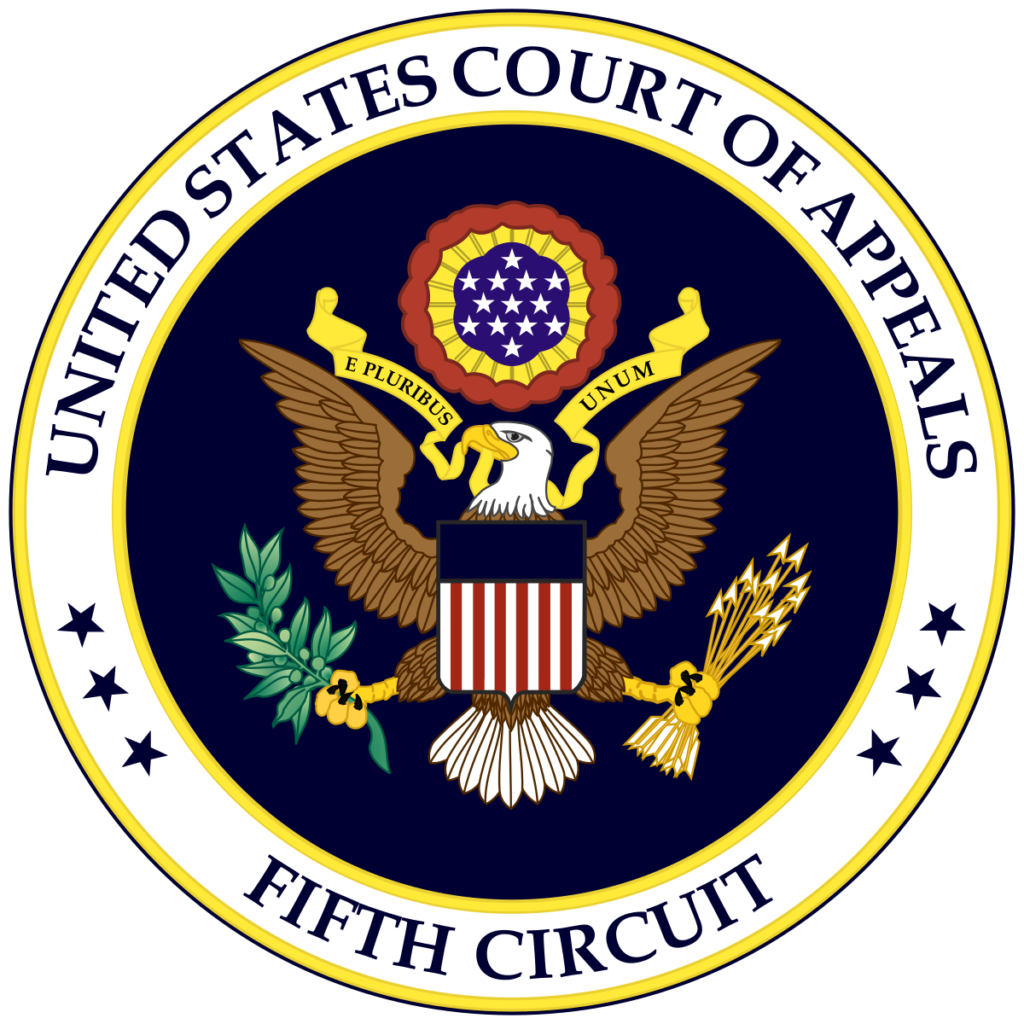
Previously, the U.S. District Court for the Southern District of Texas had issued a nationwide injunction against Executive Order 14043. That Biden Executive Order had mandated that federal employees become vaccinated from COVID-19 or face termination (we discussed the lower court’s ruling in a previous WIR). The Fifth Circuit’s ruling on Thursday resulted from the Biden Administration’s appeal of the U.S. District Court’s prior order.
Circuit Judge Carl E. Stewart (President Bill Clinton appointee) wrote the majority decision for the panel. The panel found that the U.S. District Court lacked subject matter jurisdiction to have even heard the case in the first place. Given the CSRA’s “text, structure, and purpose,” Congress’ intent in enacting the CSRA supported the Administration’s argument that judicial review of federal employment actions is limited even where plaintiffs had yet to suffer any adverse employment action.
Judge Stewart rejected the argument that plaintiffs’ claims were “wholly collateral” to the CSRA scheme, and thus were not subject to administrative review first. The court found that the underlying suit was an attempt by plaintiffs to avoid discipline for violating compliance with the Executive Order. As such, the suit was merely the vehicle by which plaintiffs sought to avoid imminent adverse employment action. The Court opined that this is the type of employment-related relief that the CSRA empowers the Merit Systems Protection Board and the Federal Circuit Court of Appeals to provide, not the U.S. District Courts.
Judge Rhesa Hawkins Barksdale (President George H.W. Bush appointee) wrote in dissent that the case the majority relied upon in support of the proposition that the CSRA precluded jurisdiction, Elgin v. Dept. of Treasury, 567 U.S. 1 (2012), involved a situation where an employee had already suffered termination for violating a statute. However, in the Feds for Medical Freedom case, plaintiffs had not yet received adverse action, and instead were seeking a ruling on only the underlying Executive Order requiring vaccination. Furthermore, Judge Barksdale argued that the pertinent section of the CSRA upon which the majority had relied did not apply to plaintiffs. The Judge came to this conclusion since she believed the section related ONLY to administrative review of employment actions already undertaken by one of the employing federal agencies. Judge Barksdale also noted that the proposed at-issue action (employment termination) was not an agency action. Rather, she characterized the dispute to be one over the President issuing an Executive Order. As such, Judge Barksdale argued that the CSRA did not cover pre-enforcement employment actions.
Note: The decision of the Fifth Circuit and the dissent did not address the substantive argument whether a President has the legal authority to impose a vaccination mandate as a term and condition of employment. Regardless, what this decision now means is that the federal Executive Branch agencies may again impose vaccination requirements on its civilian employees. The Court’s decision should lead to further certainty for the government as it continues its current plans to “return to work” in the office and to staff public services.
Thursday, April 7, 2022: New Interpretation Confirms That WIOA’s Discrimination Prohibition “Based On Sex” Includes Sexual Orientation And Gender Identity
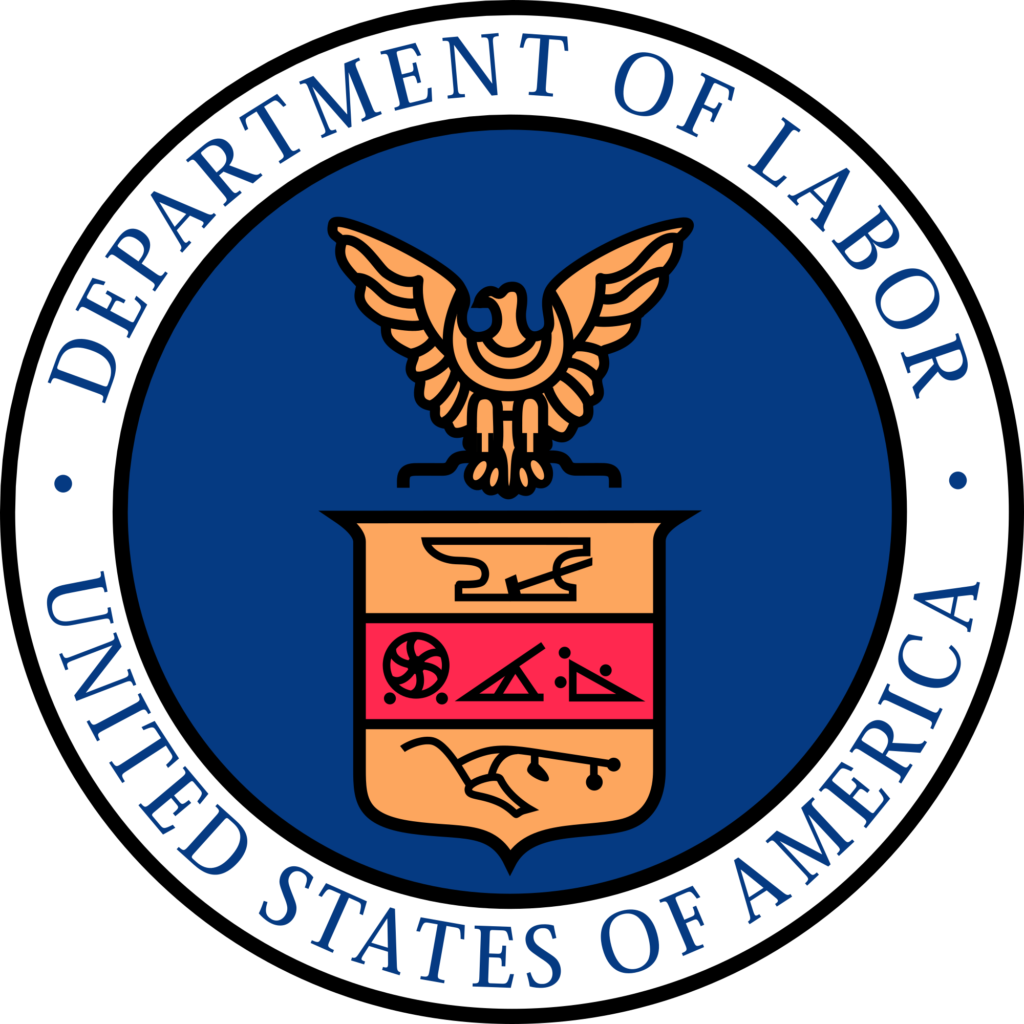
USDOL asserts that this interpretation will guide the USDOL Civil Rights Center in processing complaints and conducting investigations and compliance reviews but does not determine the outcome in any particular case or set of facts.
Note: The Department will continue to interpret and enforce Section 188’s prohibition on discrimination on the basis of sex to include discrimination on the basis of gender identity and transgender status.
What Just Happened?
USDOL issued a “Notice of Interpretation” rather than a “Notice of Proposed Rulemaking” because in Bostock v. Clayton County, the SCOTUS “interpreted” Title VII’s prohibition on “sex” discrimination to have ALWAYS (since 1964, upon enactment) made discrimination based on sexual orientation and gender identity unlawful “sex” discrimination. Therefore, USDOL is simply applying that same interpretation to WIOA’s prohibition on “sex” discrimination the Congress passed (July 2014) AFTER Title VII, thus allowing the assumption that the Congress consistently meant the same thing with the same word. Therefore, USDOL felt there was no need for Rulemaking.
Basically, this is just a “heads up” notice to the public.
See our story from June 2020, “BREAKING NEWS: Supreme Court Rules LGBT Employees are Protected from Discrimination on the Basis of Sex Under Title VII.”
What is the Federal Contractor Angle?
Of course, OFCCP’s Rules at 41 CFR Section 60-300.5(a) 2 require federal Government contractors to “list” (not “post”) job openings with the American Job Centers (AJCs) aka: Career One Stops. USDOL’s Notice to AJCs as to WIOA’s non-discrimination prohibitions now makes clear to the veteran employment representatives in the AJCs, who use WIOA monies for some of their employment assistance programs, that WIOA makes it unlawful to discriminate against gay, lesbian, or transgender jobseekers.
What is the Civil Rights Center (CRC)?
The Civil Rights Center (CRC) to which the Notice makes reference (another new federal acronym) is a part of the Office of the Assistant Secretary for Administration & Management (OASAM) at USDOL. This group is responsible for, among other things, enforcing Section 188 of WIOA and regulations issued under Section 188. These regulations prohibit the:
- exclusion of an individual from participation in,
- denial of the benefits of,
- discrimination in, or
- denial of employment in the administration of or in connection with,
any programs and activities funded or otherwise financially assisted in whole or in part under Title I (Workforce Development Activities) of WIOA on various bases, including sex. 29 U.S.C. 3248(a).
What is the Workforce Innovation & Opportunity Act (WIOA)?
Signed into law on July 22, 2014, WIOA is designed to help job seekers access employment, education, training, and support services to succeed in the labor market. It aims to match employers with the skilled workers they need to compete in the global economy. Congress passed the Act with a wide bipartisan majority; it is the first legislative reform of the public workforce system since 1998.
THIS COLUMN IS MEANT TO ASSIST IN A GENERAL UNDERSTANDING OF THE CURRENT LAW AND PRACTICE RELATING TO OFCCP. IT IS NOT TO BE REGARDED AS LEGAL ADVICE. COMPANIES OR INDIVIDUALS WITH PARTICULAR QUESTIONS SHOULD SEEK ADVICE OF COUNSEL.
SUBSCRIBE.
Compliance Alerts
Compliance Tips
Week In Review (WIR)
Subscribe to receive alerts, news and updates on all things related to OFCCP compliance as it applies to federal contractors.
OFCCP Compliance Text Alerts
Get OFCCP compliance alerts on your cell phone. Text the word compliance to 55678 and confirm your subscription. Provider message and data rates may apply.

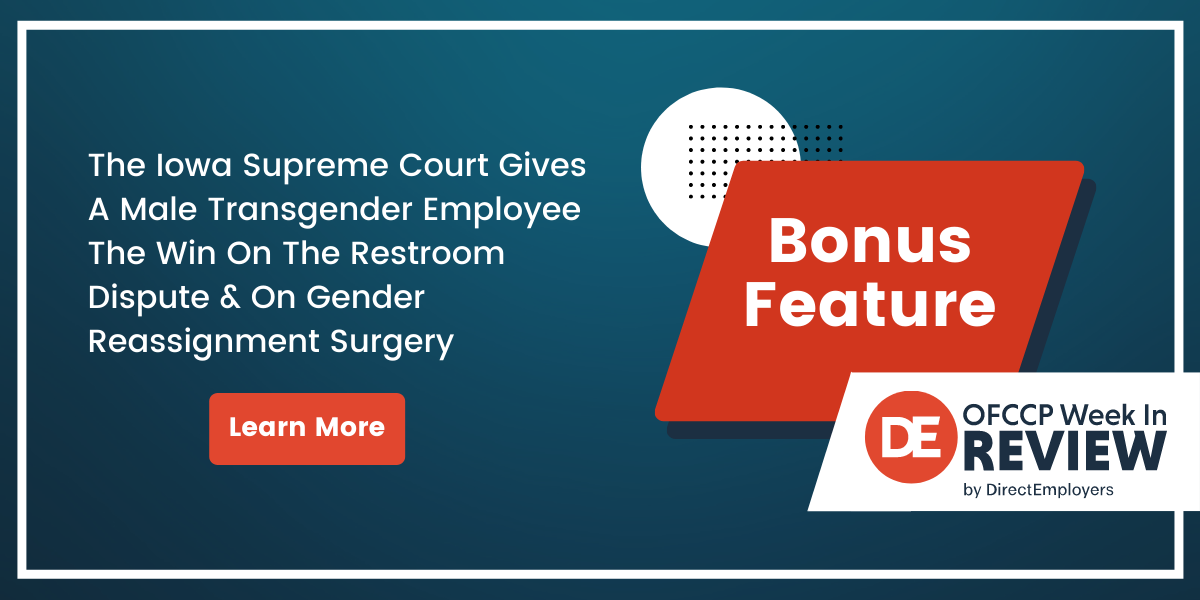

Is it required or advised for local AJC’s to update their public notices to specifically indicate the DOL recognition that non-discrimination on the basis of sex is inclusive of LGBTQ+ individuals?
Jenn: We are sorry to get back to you so late concerning your inquiry about our April 11, 2022 Week In Review article reporting the USDOL’s Notice that it would interpret the sex discrimination prohibition contained in WIOA to also include prohibitions against discrimination based on sexual orientation and gender identity. There is no duty on your part as a federal contractor to put the AJCs on notice of what USDOL has now determined. USDOL has already formally advised the AJCs.
Please let us know if you have any further questions.